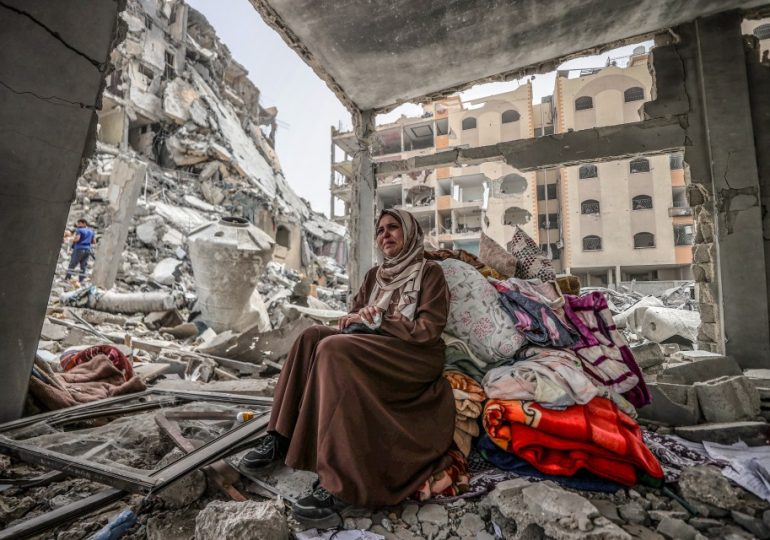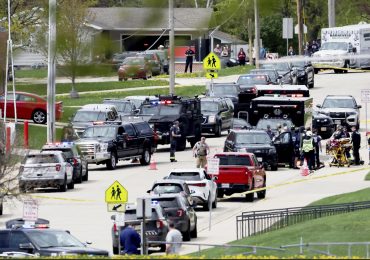ISRAEL is set to hold off on its revenge for Iran’s thwarted drone and missile blitz — in return for the green light to finally smash Hamas in Gaza.
Israeli PM Benjamin Netanyahu’s price is believed to be US and allied backing for a final showdown in Rafah, the terror group’s last stronghold, a source revealed.
GettyIsrael is set to hold off on its revenge for Iran’s missile blitz — in return for the green light to finally smash Hamas in Gaza, above[/caption]
US president Joe Biden believes Israeli PM Benjamin Netanyahu launching a blitz on Iran could trigger World War Three
Iran launched over 330 missiles and drones at Israel last Saturday night
The West fears a humanitarian catastrophe in the Strip, but with the Middle-East on a knife-edge US president Joe Biden believes a blitz on Iran could trigger World War Three.
A move against Hamas would dash its chief Yahya Sinwar’s dream of sucking Israel into a regional war.
He masterminded the October 7 attacks which detonated the current crisis, is believed to be hiding in Rafah among 1.4million and tops Israel’s Hamas “kill list”.
A former Israeli government advisor told The Sun: “The Americans are our main ally and clearly don’t want this to turn into a wider war.
“But Israel knows it’s totally justified in responding to Iran and sources tell me it is using its restraint as leverage to get the go ahead to finish the job in Gaza.
The mission since October 7 has always been to destroy Hamas and save the 100 or so hostages. Israel’s revenge on Iran may yet be a dish best served cold.”
How Israel could launch ‘revenge’ strike on Iran
By IONA CLEAVE
ISRAEL’s war cabinet has drawn up plans for a “strategic but painful” revenge attack after Iran’s unprecedented missile and drone blitz – but world leaders fear the outbreak of an “uncontrollable war”.
From a fighter jet blitz on Tehran’s nuclear facilities to strikes on IRGC bases or attacks on its regional terror proxies – The Sun pointed to five major ways Israel may choose to hit back at its enemy.
Last Saturday night, Iran attacked Israel with a wave of hundreds of ballistic and cruise missiles and drones – the first ever direct attack by Tehran on its enemy.
Israel’s Iron Dome defence system and its allies warplanes – including the UK’s RAF Typhoons – shot down 99 per cent of the projectiles.
The aerial attack was a major departure from what has been a long-running shadow war between the two states and sparked the grim possibility of an all-our war across the region.
Israel has vowed a “significant response” in revenge for the 110 ballistic missiles, 36 cruise missiles and 185 attack drones – which Jerusalem saw as a “declaration of war”.
Israeli PM Benjamin Netanyahu called off an immediate retaliation after US President Joe Biden pushed for restraint and warned him to “think carefully” about his next move.
But Israel states it reserves the right to strike Iran “at a manner and time” of its own choosing and told the UN that Iran has “crossed every red line” in its attack.
Jonathan Conicus, senior fellow at the The Foundation for Defense of Democracies and former IDF officer, said this is the “opening act” of Israeli-Iran relations.
He told The Sun: “Iran for the first time stepped out of the convenience and protection of the shadows, and decided to take on Israel directly, and by doing so, of course, Iran presents itself as a target as well.
“How will Israel retaliate? And how will Israel carry a message to the Iranians that they have definitely crossed one bridge too far?”
As the world braces for Israel’s response, UN Secretary General Antonio Guterres told an emergency Security Council meeting on Sunday: “The Middle East is on the brink.
“The people of the region are confronting a real danger of a devastating full-scale conflict. Now is the time to defuse and de-escalate.”
PM Rishi Sunak condemned Iran’s attack as “reckless” and called for calm, while a joint statement from G7 earlier this week also urged caution, fearing a “catastrophic escalation”.
But the question on everyone’s lips is how will Israel choose to respond, could it attack on Iran and what would the scale or intensity be.
Iran launched more than 320 cruise missiles and drones on Saturday to avenge an Israeli strike on Syrian capital Damascus on April 1 which killed top commanders
Israel’s missile defence backed by US, British, French and Jordanian fighters stopped 99 per cent of them.
Senior Israeli officials have admitted that an attack on Iran’s fortified nuclear sites has been “on the table” since.
Iran last night warned that its hand was “on the trigger” to attack Israel’s nuclear sites in response.
ReutersIsrael and its allies shot down 99 per cent of the projectiles but Iran has promised to strike back with 10 times the number of Israel retaliates[/caption]
A drone is launched at Israel from an undisclosed location in Iran
UK AND US ANNOUNCE NEW IRAN SANCTIONS
BRITAIN and America have announced new sanctions against the “ringleaders” of Iran’s military following the missile and drone onslaught on Israel.
Seven individuals and six entities such as the country’s operational command centre have been targeted after helping Iran conduct ‘destabalising regional activity’.
Those named are subject to a travel ban and an asset freeze with the organisations listed will have an asset freeze.
The intervention comes after more than 400 sanctions have already been imposed on Iran including the Revolutional Guard.
The joint move from the UK and US is a direct response to the attacks at the weekend where RAF jets helped shoot down some 300 Irainian drones and missiles.
The sanctions have been imposed on the Islamic Revolutionary Guards Corps Navy and the Khatemolanbia Central Headquarters who are responsible for the command of the country’s armed forces.
The IRGC Navy were embroiled in taking hold of the civilian MSC Aries in international waters and also threatened military action against Israel.
Prime Minister Rishi Sunak said: “The Iranian regime’s attack against Israel was a reckless act and a dangerous escalation.
“Today we have sanctioned the ringleaders of the Iranian military and forces responsible for the weekend’s attack.
“These sanctions – announced with the US – show we unequivocally condemn this behaviour, and they will further limit Iran’s ability to destabilise the region.”
Lord Cameron, who is currently in Capri, Italy, to meet his G7 counterparts, said the sanctions demonstrate the UK’s and US “unequivocal condemnation” of the Israel attack.
He added: “At a time of great tension in the Middle East, Iran’s decision to launch hundreds of drones and missiles towards Israel carried with it a serious risk of thousands of civilian casualties and wider escalation for the region
“The sanctions announced today alongside the US demonstrate our unequivocal condemnation of Iran’s attack on a sovereign state.
“The MSC Aries and its crew should be released immediately, and Iran should halt its reckless and unlawful behaviour. Further escalation is in no one’s interest.”
Washington targeted 16 people and two entities in Iran who produce engines for the drones deployed in the assault on Israel.
US president Joe Biden said: “Less than a week ago, Iran launched one of the largest missile and drone attacks the world has ever seen against Israel.
“Together with our allies and partners, the United States defended Israel. We helped defeat this attack. And today, we are holding Iran accountable – imposing new sanctions and export controls on Iran.
“The sanctions target leaders and entities connected to the Islamic Revolutionary Guard Corps, Iran’s Defence Ministry, and the Iranian government’s missile and drone programme that enabled this brazen assault.
“As I discussed with my fellow G7 leaders the morning after the attack, we are committed to acting collectively to increase economic pressure on Iran.
“And our allies and partners have or will issue additional sanctions and measures to restrict Iran’s destabilising military programmes.”









